NEW ORLEANS - One of the nation's largest insurance companies is lobbying Congress for permission to sell policies that cover damage from both wind and floodwater, a plan billed as a way for insurers and homeowners to avoid costly litigation after disasters such as Hurricane Katrina.
The company, Nationwide Mutual Insurance Co., also said that expanding its homeowner policies to include flood coverage could save taxpayer money by reducing costs for the federally subsidized National Flood Insurance Program.
Its plan, which would require congressional approval, calls for the Columbus, Ohio, company to sell flood insurance at the same price as the subsidized NFIP policies. Policyholders would have the option of buying flood coverage beyond the limits of the national program.
Also, unlike other homeowner rates, prices for Nationwide's expanded policies would be exempt from state regulation.
Officials from the insurer have briefed more than a dozen members of Congress on the plan but have not yet drafted a formal proposal.
"This is without a precedent. There are no precursors to this," said Craig Zimpher, Nationwide's vice president for government relations.
Zimpher said the benefits of having one policy cover both wind and flood damage were illustrated by the recent flooding in the Midwest and by its wind-vs.-water disputes with policyholders on the Gulf Coast after Katrina.
In the aftermath of the August 2005 storm, thousands of property owners in Mississippi and Louisiana without flood insurance sued their insurers for refusing to cover damage from Katrina's wind-driven storm surge.
"We see this [plan] as a viable alternative to much of the litigation that occurred post-Katrina," Zimpher said. "No one, whether it's insurers or consumers, benefits from litigation."
Rep. Gene Taylor (D., Miss.), a fierce critic of the insurance industry's handling of Katrina claims, is one of the lawmakers who have been briefed on Nationwide's plan.
Brian Martin, Taylor's policy director, said the proposal could benefit consumers if other insurance companies followed Nationwide's lead and created a competitive market for flood coverage. Such coverage is a risk that private insurance companies traditionally have not wanted to take on.
Martin said the plan should also include federal government regulation and oversight so that insurers do not "cherry-pick" policyholders and exclude properties at the greatest risk of flood damage.
"The current system is leaving gaps in coverage," he said. "There will always be disputes as long as you have wind and flood in separate policies."
Nationwide said its expanded homeowner coverage would be voluntary for its customers. The Treasury Department would regulate and "reinsure" Nationwide's flood coverage. The cost of reinsuring Nationwide's policies would be paid in part by a percentage of the flood premiums collected by the company.
Reinsurers sell backup coverage to other insurers, spreading risk so the system can handle large or widespread losses.
While the price of Nationwide's flood coverage would mirror the cost of NFIP policies, prices for the wind, theft and fire portions of the expanded policies would not be subject to government price controls, the company said.
Katrina inspired Nationwide's proposal, but the company says its expanded policies would benefit homeowners far from the Gulf Coast. Many of the homes damaged or destroyed this month by water from the swollen Mississippi River weren't covered by flood insurance.
WEATHER NOTE
Hurricane Center director talks forecasting in interviewBy JESSICA GRESKO
Associated Press Writer
MIAMI (AP) - Substantially improving the accuracy of hurricane intensity predictions could take years and tens of millions of dollars, the National Hurricane Center's director said Tuesday.
In an interview with The Associated Press, Bill Read said reducing by half the errors made in tasks such as determining whether a storm would remain a Category 1 or grow stronger would be a costly and long-term effort.
Predicting a storm's intensity is much harder for meteorologists than estimating where it will go. Since 1990, forecasters have reduced by more than half their errors in predicting a storm's path, but over the same time the accuracy of their intensity forecasts has remained virtually unchanged.
``To really get after that you're talking tens of millions of dollars, if not more, to reach an ambitious goal,'' Read said. ``We've made a steady gain in the improvement of the track forecasts, and we haven't figured out how to do that yet for rapid intensification.''
That could take between five and 10 years, he said.
Read said he's satisfied for now with the $3 million the government is spending this year for research into improving intensity forecasts. Long-term improvement, however, would require a sustained investment.
Read took the helm of the National Hurricane Center in January. The six-month Atlantic hurricane season which officially began June 1 is his first as director. The center monitors the movement and strength of tropical weather systems and issues storm watches and warnings for the U.S. and surrounding areas.
Read said he expects to spend a lot of time talking about preparing for storms, as other directors have. He said it's denial, not complacency, that keeps many people from being prepared. They just don't think a storm will hit, and that's what emergency managers and others have to overcome, he said.
Read also talked about the sensitive issue of a suggested link between global warming and hurricanes, acknowledging it carries ``so much emotional baggage'' it can be ``really hard to sift out the science.''
Read said he agreed with others at the National Oceanic and Atmospheric Administration and that the link between global warming and hurricanes ``is still to be determined.'' While people who model climate largely believe ``global warming is real and it's going to get worse,'' Read said, there is much more disagreement about the effect of warming on tropical storms and whether the number and intensity of storms will be affected.
``All of that comes out as different numbers. I think there are a lot of unresolved issues in the science,'' Read said.
MARITIME NOTE
USA. Boaters should prepare for July 4 safety
Wednesday, 25 June 2008
Here are ten tips that will help you stay safe this July 4th holiday weekend:
1. Put safety into your weekend plan: The Foundation's free Online Boating "Toolbox" at http://www.BoatUS.com/Foundation/Guide has helpful information on trip planning and preparation, boating equipment, emergency preparation, navigation, and quizzes to test your knowledge. The Foundation also offers a free NASBLA-approved online boating safety course for residents of more than 30 states at http://www.BoatUS.org/Onlinecourse
2. "Little" guests need life jackets: Everyone wants to be on the boat this holiday weekend, but do you have the right-sized life jacket aboard for any visiting kids? The BoatU.S. Foundation loans children's life jackets for free at over 350 marinas, fuel docks, and other waterfront businesses and boat clubs. To find a location near you go to http://www.BoatUS.com/Foundation/LJLP
3. Take your time to get home: July 4th is the one time a year many fair-weather boaters - who may rarely navigate in the dark - venture out after the sun goes down. The most reported type of boating accident is a collision with another vessel so it's a good idea to keep your speed down, post an extra lookout, and ensure all your navigation lights work. A spotlight is a must, and ensure all safety gear is readily available and life jackets are worn. Be extra vigilant about not running over anchor lines in crowded fireworks viewing areas, and don't take shortcuts in the dark.
4. Wear life jackets: Almost three-quarters of all fatal boating accident victims drowned, and of those, 87% were not wearing a life jacket. Accidents can happen very quickly, sometimes leaving no time to don a life jacket.
5. Don't overload your boat: Resist the urge to invite more friends or family to the fireworks show than what your boat was designed to carry. Heavily loaded small boats, and those with little freeboard such as bass boats, are more susceptible to swamping from weather or wake action associated with heavy July 4th boating traffic.
6. It's a long day: A full day in the sun will increase alcohol's effects on the body, so it's better to wait until you're safely back at the dock or home before breaking out the libations. Also bring lots of water, a VHF radio, and check the weather reports to avoid storms.
7. Know how to get back in the boat: A fall overboard can turn into a life-threatening situation pretty quickly, especially for small boats without built-in boarding ladders. The BoatU.S. Foundation recently tested a range of portable boarding ladders, and you may be surprised what they found. To view video of these ladders in our boarding tests, or learn which ladder may be best for you, see the Foundation Findings #44 at http://www.BoatUS.com/Foundation
8. Never run the engine when swimmers are in the water: Raft-ups, or groups of boats tied together in a protected anchorage, is a great way to spend the holiday with fellow boating friends. But you should never run an engine, or a generator for that matter, with swimmers in the water near exhaust ports or props. Even though the boat's transmission may not be in gear, propellers can still rotate, and odorless, colorless carbon monoxide can quickly overcome swimmers.
9. Take a local boating safety class: The Foundation has most complete list of boating safety courses taught in communities across the country. To find one near you, go to http://www.BoatUS.com/Courseline
10. Cruising offshore? An emergency position indicating rescue beacon (EPIRB) from the BoatU.S. Foundation's EPIRB rental program will give you the margin of safety you need during an offshore passage. These $750 beacons rent for just $40 per week (plus shipping). Go to http://www.BoatUS.com/Foundation/Epirb
RS









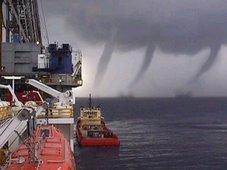
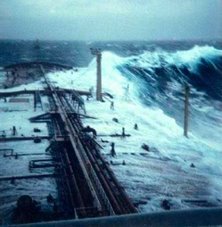
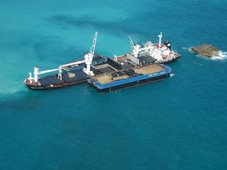
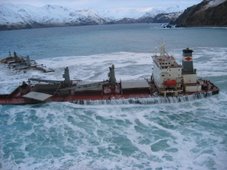
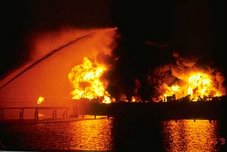
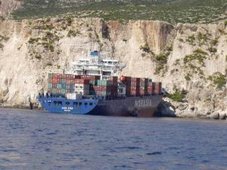


![Validate my RSS feed [Valid RSS]](valid-rss.png)
No comments:
Post a Comment